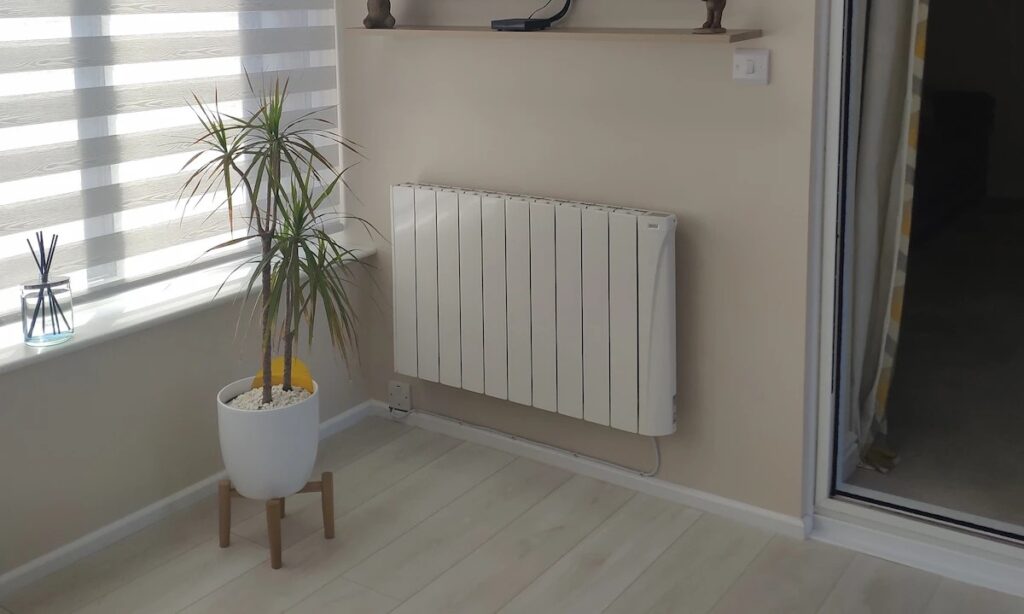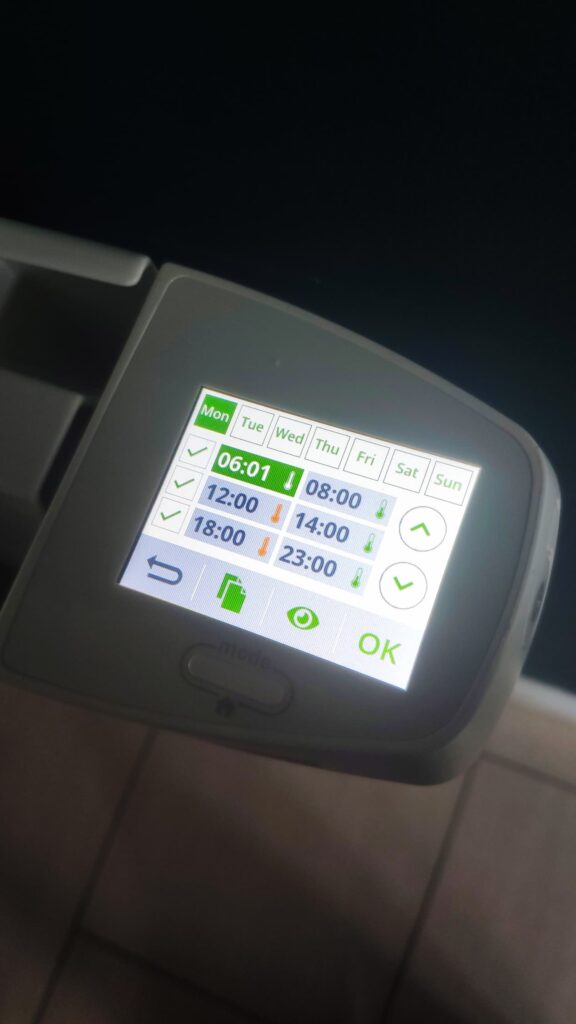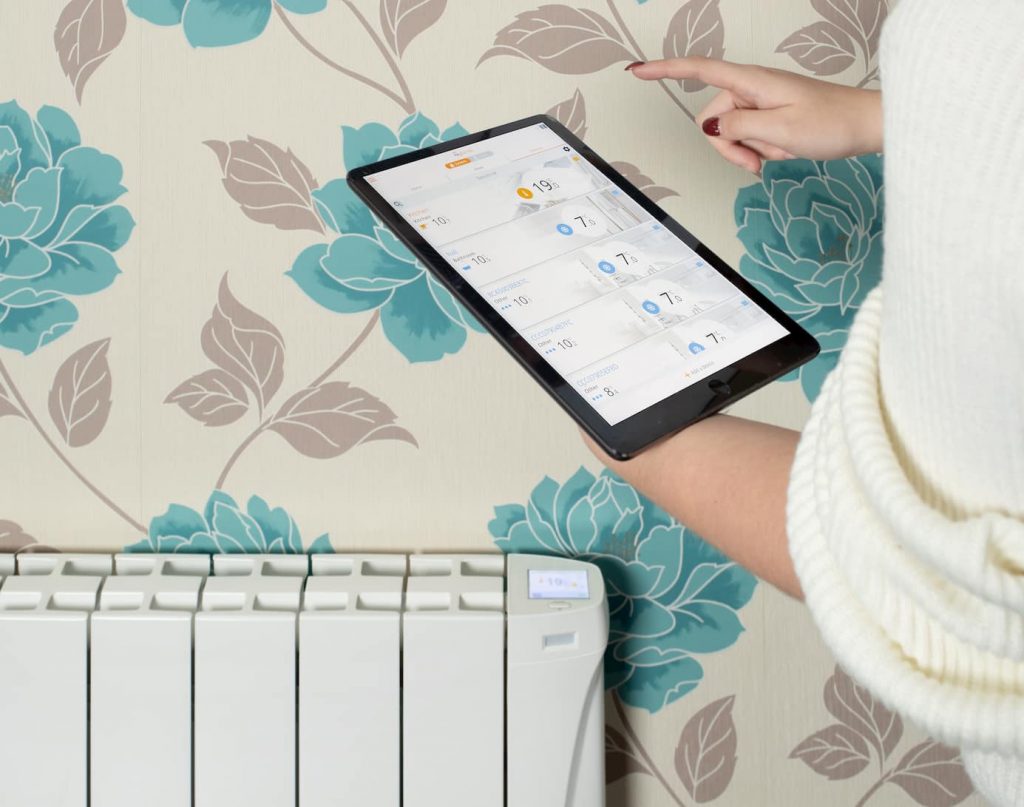Before we can answer that question and determining which heating system is best for your home, it’s essential to understand the differences between Gas Central Heating and Electric Heating Systems. Each option has distinct advantages, energy efficiency considerations, and cost implications, let’s define the difference between Gas Central Heating and Electric Heating Systems.
Gas heating systems use a boiler to burn fuel and send hot water via pipes to connected radiators, taps, showers, etc. (This also applies to Oil and LPG systems). As radiators warm up, the air is heated by convection and radiation.
Electric heating systems feature radiators connected to the electricity supply of the property. It allows each radiator to work independently using individual thermostats, meaning that each unit can be individually programmed. There are a variety of options including Storage Heaters (high density thermal brick), Oil Filled Radiators (pre-filled with thermodynamic fluid) and Ceramic (natural stone heating element).
Storage Heaters are now considered old technology so, for the purposes of this article, we are going to focus on the new generation of thermodynamic Aluminum radiators.



So, is Gas cheaper?
The simple answer is Yes….and No. Gas, measured by cost per unit (kilowatt hour), is significantly cheaper than electricity. At the time of writing the Gas unit price was £.07p/kWh, while Electricity is £0.27 per kWh, over 3 times as much. However, while cost per unit is important, there are many other elements that need to be considered.
To calculate what the experts call ‘Total Cost of Ownership’, or TCO, we need to look at all the costs associated with each system across its lifetime. Those costs include Energy Costs, Running Costs, Installation, Efficiency, Control, Safety, Maintenance, and even Legislative and Social factors. Let’s look at them in detail.
Energy Costs
As we’ve already mentioned the Gas v. Electricity unit costs are 7p v. 27p. We should also add the Daily Standing Charges of 32p and 51p respectively. Energy providers also charge 5% VAT on both services (Boo!).
(Money Saving Expert, August 2024)
Annual Running Costs
To understand the annual running costs of each solution we turned to the experts – checkatrade.com. They have published many articles comparing the installation and running costs of a range of home heating systems.
- Electric* – Storage Heater System – £4,500 per year
- Electric** – Smart Wi-fi Radiator System – £1,800 per year
- Gas* – Boiler plus radiator system – £1,200 per year
(Checkatrade, March 2024, based on a 3 bedroom New Build detached house) (*Intelliheat, based on case study from similar property)
Installation
Electric heating systems are easier and cheaper to install compared to gas central heating (which requires pipes, vents, ducts and, of course, radiators). Electric systems only need connecting to the electric circuit via a socket, or they can be hardwired during construction.
Installing a gas system can be a long process to complete and requires certified professionals. Electric systems can be installed as quickly as in a day, are operational in minutes and can be a DIY job with minimal skills if you replace an existing panels or storage heaters system.
- Average installation of a gas central heating system plus steel radiators – £5,250
- Average installation of electric heating plus heating management system – £3,750
(Checkatrade, 2024, based on a 3 bedroom New Build detached house. Assumes cost of Gas Engineer (gas system) and Professional Electrician (electric system)
Efficiency
Gas boilers are inefficient compared to electric systems. Electric heating is 100% efficient at the point of use (ie. every watt of energy used by the radiator is converted into heat). Gas central heating, however, can lose up to 50% of heat energy through pipework. Even a modern boiler can waste 10% of input energy. Electricity is also needed to run a gas boiler and its pumps. With gas-driven ‘wet’ solutions heat loss will increase with age as sludge accumulates in the system.
Control
Control is a critical factor in achieving energy efficiency. Electric heating systems allow complete control of each radiator, area, floor, including multiple properties. There are premium solutions, such as our iSense range, with customized programming, smart assistants, occupancy and open window detection, and even self-learning. All enabled from an APP on a mobile device.
Gas systems are very limited to turning down radiators, but even then, the whole boiler system still needs to be active, with all the waste that it brings. ‘Control’ is so important that combining a Heating Management Control System (HMS) with connected electric radiators can cut bills by up to 30%. (The Guardian, 2022)

Safety
Electric heating systems are generally considered safer than gas. Safety issues, such as carbon monoxide emissions or explosions, are eliminated. There is no risk of damage to the property from leaking or bursting pipework. Gas systems can also be noisy due to hot water rushing through the pipes. Known as ‘kettling’ this noise can be a warning sign of build-up of sludge or limescale in the system.
Maintenance
Once electric heating systems are in place, there is no maintenance service, most electric heating systems, particularly electric radiators, do not have many moving parts, which contributes to their low maintenance requirements and increased longevity. A gas central heating system boiler, on the other hand, must be serviced once a year by a certified engineer. Electric heating systems are expected to last longer than gas central heating systems. Some manufacturers even offer 10-year warranties. A gas boiler will last around 15 years before it needs replacing, which carries a significant cost.
A new boiler supply and install costs from £3,000 to £4,500. (Checkatrade, 2024, assumes a gas combi boiler)
The Future
UK government plans to phase out Gas (and Oil) boilers in new build properties after 2025, aiming for a broader shift to low-carbon alternatives like heat pumps by 2035. So, all new build properties will require an alternative. As existing boilers come to the end of their life, homeowners will also need to plan for alternatives. Gas is obviously a fossil fuel. So, burning it to generate heat releases carbon dioxide (CO2) into the atmosphere. Heating UK homes creates more CO2 than driving or flying.
In fact, heating our homes is responsible for around 15% of the UK’s greenhouse gas emissions. (UK Gov, 2020)
The good news is that renewables (eg. solar, offshore wind) generated nearly 50% of all UK electricity needs in the first 3 months of this year. By using greener inputs to our home heating we will increasingly see greener outputs. (UK Gov, Energy Trends, June 2023)
In Conclusion
We’ve seen that there is no easy answer to our original question, but there are some firm conclusions we can draw:
Go for Electric?
• New builds – Electric Heating Systems are a ‘no brainer’
• LPG, OIL boiler? – get a quote for removal and replacement with electric
• Extensions, Lofts, Conservatories – add smart radiators instead of extending pipework
• Multi-dwelling projects – tight cost control at the touch of a button
Already have Gas?
• Stick with it until the boiler needs replacing
• Consider using smart thermostats
• Maybe get a new boiler before 2025
More food for thought
• Replacing a gas, LPG boiler? – get a quote for removal and replacement with electric
• Add Solar panels to supplement your energy needs, and lower your bills further
• After 2025 and beyond? – consider adding Heat Pumps to drive an electric heating system
Choosing to install smart electric heating can reduce your electricity costs, Intelli Heat are the Electric heating specialists, and by switching to smart heating, you can let your Energy savings pay for your new heating.
